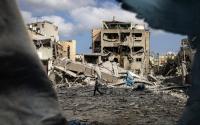18 June 2007Severin Carrell
Lawyers are to make fresh moves to overturn the conviction of a Libyan jailed for the Lockerbie bombing after new evidence emerged. The Scottish Criminal Cases Review Commission is widely expected to announce later this month that it has serious concerns about the conviction of Abdelbasset Ali Mohmed al-Megrahi, jailed for life in 2001 for the murder of 270 people when Pan Am Flight 103 blew up over Lockerbie.
Legal concerns about the conviction centre on the reliability of testimony from the Maltese shopkeeper who played a key role in identifying the Libyan as a suspect, and the quality of the forensic evidence about a fragment of circuit board allegedly found at the crash site. The commission, which has been reviewing the case for nearly four years, is ready to return the case to an appeal court in Edinburgh. Many legal observers believe Megrahi's conviction will be quashed, in effect clearing Libya of responsibility and increasing pressure for a fresh investigation into the identity of the terrorists behind the atrocity.
Relatives of the Lockerbie victims believe there is growing evidence which confirms links to Iran and Syria - the two states originally blamed for the bombing - including a series of previously unexplained incidents at Heathrow airport.
Jim Swire, whose daughter Flora was on board the New York-bound flight, told the Guardian he was very suspicious about two events at Heathrow in the hours before Flight 103 took off which suggested strongly that the bomb was planted in the UK and not - as previously alleged - in Malta or in Frankfurt.
The prosecution claimed at the trial in 2000-01 that Megrahi, a Libyan government sanctions buster who frequently went to Malta but insists he is innocent, planted the bomb on a connecting flight from Malta. Many legal and intelligence experts believe the bomb was most likely put on the Pan Am jet at Frankfurt by Syrian and Iranian-backed Palestinian terror groups, in retaliation for the destruction of an Iranian airliner by the USS Vincennes in the Gulf in July 1988, killing 290 people.






